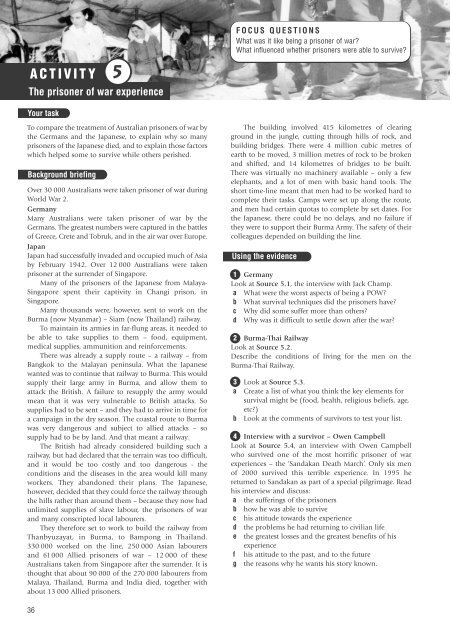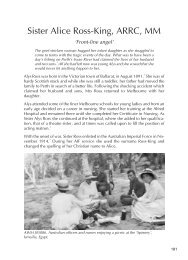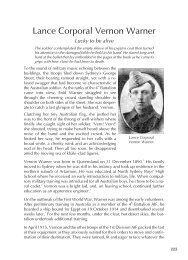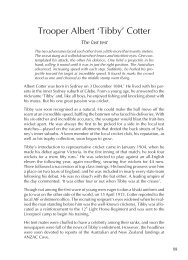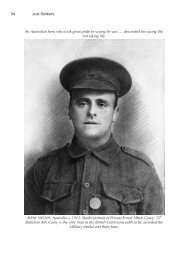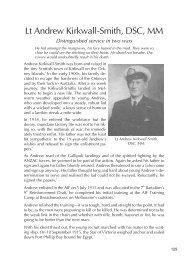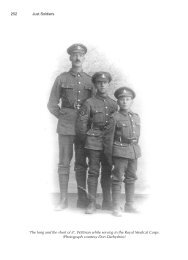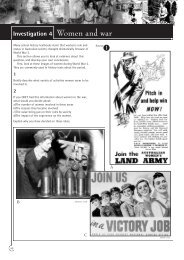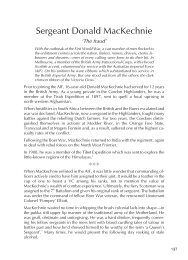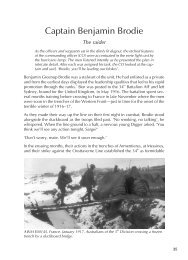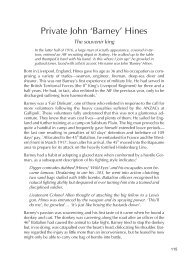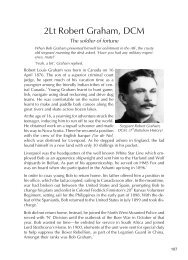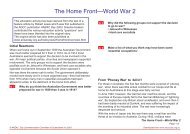The prisoner of war experience - ANZAC Day Commemoration ...
The prisoner of war experience - ANZAC Day Commemoration ...
The prisoner of war experience - ANZAC Day Commemoration ...
You also want an ePaper? Increase the reach of your titles
YUMPU automatically turns print PDFs into web optimized ePapers that Google loves.
A C T I V I T Y 5<br />
<strong>The</strong> <strong>prisoner</strong> <strong>of</strong> <strong>war</strong> <strong>experience</strong><br />
Your task<br />
To compare the treatment <strong>of</strong> Australian <strong>prisoner</strong>s <strong>of</strong> <strong>war</strong> by<br />
the Germans and the Japanese, to explain why so many<br />
<strong>prisoner</strong>s <strong>of</strong> the Japanese died, and to explain those factors<br />
which helped some to survive while others perished.<br />
Background briefing<br />
Over 30 000 Australians were taken <strong>prisoner</strong> <strong>of</strong> <strong>war</strong> during<br />
World War 2.<br />
Germany<br />
Many Australians were taken <strong>prisoner</strong> <strong>of</strong> <strong>war</strong> by the<br />
Germans. <strong>The</strong> greatest numbers were captured in the battles<br />
<strong>of</strong> Greece, Crete and Tobruk, and in the air <strong>war</strong> over Europe.<br />
Japan<br />
Japan had successfully invaded and occupied much <strong>of</strong> Asia<br />
by February 1942. Over 12 000 Australians were taken<br />
<strong>prisoner</strong> at the surrender <strong>of</strong> Singapore.<br />
Many <strong>of</strong> the <strong>prisoner</strong>s <strong>of</strong> the Japanese from Malaya-<br />
Singapore spent their captivity in Changi prison, in<br />
Singapore.<br />
Many thousands were, however, sent to work on the<br />
Burma (now Myanmar) – Siam (now Thailand) railway.<br />
To maintain its armies in far-flung areas, it needed to<br />
be able to take supplies to them – food, equipment,<br />
medical supplies, ammunition and reinforcements.<br />
<strong>The</strong>re was already a supply route – a railway – from<br />
Bangkok to the Malayan peninsula. What the Japanese<br />
wanted was to continue that railway to Burma. This would<br />
supply their large army in Burma, and allow them to<br />
attack the British. A failure to resupply the army would<br />
mean that it was very vulnerable to British attacks. So<br />
supplies had to be sent – and they had to arrive in time for<br />
a campaign in the dry season. <strong>The</strong> coastal route to Burma<br />
was very dangerous and subject to allied attacks – so<br />
supply had to be by land. And that meant a railway.<br />
<strong>The</strong> British had already considered building such a<br />
railway, but had declared that the terrain was too difficult,<br />
and it would be too costly and too dangerous - the<br />
conditions and the diseases in the area would kill many<br />
workers. <strong>The</strong>y abandoned their plans. <strong>The</strong> Japanese,<br />
however, decided that they could force the railway through<br />
the hills rather than around them – because they now had<br />
unlimited supplies <strong>of</strong> slave labour, the <strong>prisoner</strong>s <strong>of</strong> <strong>war</strong><br />
and many conscripted local labourers.<br />
<strong>The</strong>y therefore set to work to build the railway from<br />
Thanbyuzayat, in Burma, to Bampong in Thailand.<br />
330 000 worked on the line, 250 000 Asian labourers<br />
and 61 000 Allied <strong>prisoner</strong>s <strong>of</strong> <strong>war</strong> – 12 000 <strong>of</strong> these<br />
Australians taken from Singapore after the surrender. It is<br />
thought that about 90 000 <strong>of</strong> the 270 000 labourers from<br />
Malaya, Thailand, Burma and India died, together with<br />
about 13 000 Allied <strong>prisoner</strong>s.<br />
F O C U S Q U E S T I O N S<br />
What was it like being a <strong>prisoner</strong> <strong>of</strong> <strong>war</strong>?<br />
What influenced whether <strong>prisoner</strong>s were able to survive?<br />
<strong>The</strong> building involved 415 kilometres <strong>of</strong> clearing<br />
ground in the jungle, cutting through hills <strong>of</strong> rock, and<br />
building bridges. <strong>The</strong>re were 4 million cubic metres <strong>of</strong><br />
earth to be moved, 3 million metres <strong>of</strong> rock to be broken<br />
and shifted, and 14 kilometres <strong>of</strong> bridges to be built.<br />
<strong>The</strong>re was virtually no machinery available – only a few<br />
elephants, and a lot <strong>of</strong> men with basic hand tools. <strong>The</strong><br />
short time-line meant that men had to be worked hard to<br />
complete their tasks. Camps were set up along the route,<br />
and men had certain quotas to complete by set dates. For<br />
the Japanese, there could be no delays, and no failure if<br />
they were to support their Burma Army. <strong>The</strong> safety <strong>of</strong> their<br />
colleagues depended on building the line.<br />
Using the evidence<br />
1 Germany<br />
Look at Source 5.1, the interview with Jack Champ.<br />
a What were the worst aspects <strong>of</strong> being a POW?<br />
b What survival techniques did the <strong>prisoner</strong>s have?<br />
c Why did some suffer more than others?<br />
d Why was it difficult to settle down after the <strong>war</strong>?<br />
2 Burma-Thai Railway<br />
Look at Source 5.2.<br />
Describe the conditions <strong>of</strong> living for the men on the<br />
Burma-Thai Railway.<br />
3 Look at Source 5.3.<br />
a Create a list <strong>of</strong> what you think the key elements for<br />
survival might be (food, health, religious beliefs, age,<br />
etc?)<br />
b Look at the comments <strong>of</strong> survivors to test your list.<br />
4 Interview with a survivor – Owen Campbell<br />
Look at Source 5.4, an interview with Owen Campbell<br />
who survived one <strong>of</strong> the most horrific <strong>prisoner</strong> <strong>of</strong> <strong>war</strong><br />
<strong>experience</strong>s – the ‘Sandakan Death March’. Only six men<br />
<strong>of</strong> 2000 survived this terrible <strong>experience</strong>. In 1995 he<br />
returned to Sandakan as part <strong>of</strong> a special pilgrimage. Read<br />
his interview and discuss:<br />
a the sufferings <strong>of</strong> the <strong>prisoner</strong>s<br />
b how he was able to survive<br />
c his attitude to<strong>war</strong>ds the <strong>experience</strong><br />
d the problems he had returning to civilian life<br />
e the greatest losses and the greatest benefits <strong>of</strong> his<br />
<strong>experience</strong><br />
f his attitude to the past, and to the future<br />
g the reasons why he wants his story known.<br />
36
Applying issues to today<br />
5 Most Australians who <strong>experience</strong>d the Second World<br />
War say that they cannot forgive or forget their enemy in<br />
the <strong>war</strong>, Japan. <strong>The</strong>y also stress that they want young<br />
Australians today to know what happened. Do you think<br />
this emphasis on remembering horrific events, as well as<br />
uplifting ones, is appropriate today?<br />
6 <strong>The</strong> Australian <strong>prisoner</strong>s <strong>of</strong> <strong>war</strong> were brought up on<br />
heroic tales <strong>of</strong> the fighting <strong>ANZAC</strong> tradition. A <strong>prisoner</strong> is<br />
taken out <strong>of</strong> the fighting, and yet we have great respect for<br />
those Australians who survived the <strong>war</strong> as <strong>prisoner</strong>s. What<br />
elements <strong>of</strong> their <strong>experience</strong> and behaviour do you think<br />
are ‘heroic’?<br />
Using the web<br />
In 1945 over 2000 Australian and British <strong>prisoner</strong>s <strong>of</strong> <strong>war</strong><br />
were held by the Japanese at Sandakan, in Borneo. Six <strong>of</strong><br />
them survived. What happened to the rest?<br />
Your task is to discover:<br />
• What the <strong>experience</strong> <strong>of</strong> being a <strong>prisoner</strong> <strong>of</strong> <strong>war</strong> at<br />
Sandakan was like<br />
• How many <strong>of</strong> the <strong>prisoner</strong>s died<br />
• How they died<br />
• Where they died<br />
• When these deaths occurred<br />
• Who was responsible<br />
• What the families <strong>of</strong> the dead can be told<br />
• What happened to those who escaped<br />
• Why more did not escape<br />
• What evidence exists to carry out <strong>war</strong> trials against<br />
those responsible for <strong>war</strong> crimes discovered in your<br />
investigations<br />
• What the problems are with coming to definite<br />
conclusions about what happened.<br />
See the evidence on the <strong>ANZAC</strong> <strong>Day</strong> <strong>Commemoration</strong><br />
Committee <strong>of</strong> Queensland site at http://www.anzacday.<br />
org.au<br />
Source 5.1<br />
Interview with a <strong>prisoner</strong> <strong>of</strong> <strong>war</strong> <strong>of</strong> the Germans – Jack Champ<br />
Feelings on capture<br />
How did I feel – it’s a feeling <strong>of</strong> complete devastation – it’s<br />
never going to happen to you – killed or wounded perhaps but<br />
never captured – it’s over, you are now a <strong>prisoner</strong> <strong>of</strong> <strong>war</strong>.<br />
Imprisonment in Colditz <strong>prisoner</strong> <strong>of</strong><br />
<strong>war</strong> castle<br />
Colditz has a reputation <strong>of</strong> being unpleasant but I didn’t find it<br />
that way. Everyone in Colditz had an escaping record or were<br />
very anti-German. <strong>The</strong> attitude here was that we did everything<br />
we could to upset the German routine. For example, we <strong>of</strong>ten<br />
didn’t turn up on parade, and this caused the Germans trouble<br />
with the counting <strong>of</strong> us.<br />
Another time we were having identity photos taken. <strong>The</strong><br />
photographer was there, and a sentry with a rifle. Suddenly, out<br />
<strong>of</strong> the window came water bombs and the photographer and<br />
sentry raced <strong>of</strong>f in search <strong>of</strong> them. We were all called out on<br />
parade and <strong>of</strong> course we had pinched the camera. <strong>The</strong>re was<br />
disruption for a couple <strong>of</strong> hours and we could use the camera<br />
to help in escape attempts. <strong>The</strong>re were 30 successful escapes<br />
while I was there.<br />
Jack Champ<br />
Studies<br />
<strong>The</strong> hard bit was overcoming boredom. I studied for a<br />
chartered accountancy exam in England and after the <strong>war</strong><br />
found that I had passed! A lot <strong>of</strong> people studied.<br />
Red Cross<br />
We got issues <strong>of</strong> these wonderful parcels – bully beef, tea,<br />
c<strong>of</strong>fee, herrings, tomato sauce. Because <strong>of</strong> them we were able<br />
to maintain our weight, and play some sport such as footy,<br />
cricket, tennis.<br />
Mateship<br />
Well I think that mateship is terribly important in <strong>war</strong>time.<br />
When you are fighting a <strong>war</strong> you are completely dependent<br />
upon one another. When your own life depends upon the<br />
actions <strong>of</strong> your friend the bond that is built up becomes<br />
completely impregnable, it’s a wonderful thing, a thing you<br />
never forget.<br />
Letters from home<br />
We were fortunate in that regard – the mail in was eventually<br />
quite good but we were allowed to send only four postcards<br />
and three letter cards out a month. We couldn’t say much<br />
because they were censored but families could write and it<br />
was wonderful to get them, to know that everything was going<br />
all right at home – it was good!<br />
Single/married<br />
It was worse for the married men. Us single blokes didn’t have<br />
much to worry about - but for a married man with children it<br />
was very hard to be separated from those they were so fond<br />
<strong>of</strong> – some <strong>of</strong> them hadn’t even seen their children and to go<br />
so many years must have been very hard on them.<br />
After the <strong>war</strong><br />
It was hard to settle down after the <strong>war</strong>. Your whole life had<br />
been the army, and when I got back it was hard to settle into a<br />
9 to 5 job. Fortunately I played a lot <strong>of</strong> sport, and that kept me<br />
going. After a time I settled down and eventually got back into<br />
civilian life. But it took time, and was difficult at first.<br />
Interview 1995<br />
37
Source 5.2 Experiences on the Burma-Thai Railway<br />
A<br />
<strong>The</strong> Japanese underfed the troops, gave them no medical<br />
supplies, constantly overworked them, and frequently<br />
bashed men for no reason.<br />
Terrible physical punishments<br />
were <strong>of</strong>ten given out, such as<br />
standing in the sun holding<br />
a rock over your head, with<br />
a bashing if you collapsed or<br />
lowered the rock. Sick men<br />
were forced to work.<br />
Based on Hank Nelson,<br />
Prisoners <strong>of</strong> War. Australians Under Nippon,<br />
ABC, Sydney, 1986/1990 passim.<br />
AWM 38649<br />
B<br />
<strong>The</strong> reason why most men died is simple: they starved.<br />
<strong>The</strong> greatest atrocity committed by the Japanese<br />
against the <strong>prisoner</strong>s is that they did not feed them. …<br />
. <strong>The</strong> few grams <strong>of</strong> rice, watery vegetable stew and<br />
infrequent flavouring from meat and fish … would not<br />
sustain men who were being forced to work at<br />
maximum effort. <strong>The</strong>y were vulnerable to diseases<br />
which would not have killed, and perhaps not afflicted,<br />
the <strong>prisoner</strong>s had they been well-fed.<br />
Hank Nelson, Prisoners <strong>of</strong> War. Australians Under Nippon,<br />
ABC, Sydney, 1986/1990 page 51<br />
E.R. (Bon) Hall, Burma-Thai Railway <strong>of</strong> Death, Graphic Books, Melbourne, 1981<br />
C<br />
We slept on the floor, close up to each other,<br />
men dying, screaming and moaning; spewing<br />
and bogging going on amongst us; delirious<br />
fits and morphine injections by the light <strong>of</strong> a<br />
candle; fires in the hut all night; men at all<br />
times walking up and down the central<br />
passageway to the latrines; it made it all a<br />
corner <strong>of</strong> hell brought to earth. This was no<br />
figure <strong>of</strong> speech if you were lying next to a<br />
man about to die and lying next to him still,<br />
after he was dead.<br />
Douglas McLaggan, <strong>The</strong> Will To Survive, A Private’s<br />
View As A POW, Kangaroo Press, Sydney,<br />
1995 page 123<br />
<strong>The</strong> War Diaries <strong>of</strong> Weary Dunlop, Viking, Melbourne, 1986<br />
38
Source 5.2<br />
Continued<br />
D<br />
<strong>The</strong> ground turned to mud, your clothes rotted away, your boots, if you<br />
had any boots at that stage, rotted <strong>of</strong>f. <strong>The</strong> six-foot latrine pits which we<br />
had dug filled up with water and in no time the whole camp area was<br />
crawling with maggots. In the cemetery the graves filled up with water<br />
and the bodies came to the top. But none <strong>of</strong> this affected the progress <strong>of</strong><br />
the railway.<br />
Hank Nelson, Prisoners <strong>of</strong> War.<br />
Australians Under Nippon,<br />
ABC, Sydney, 1986/1990 page 46<br />
F<br />
Fred Ransome-Smith,<br />
Working on the Thai<br />
Burma Railway <strong>of</strong> Death<br />
‘Occasionally ... we’d get cases <strong>of</strong> prawns. But by the time they<br />
reached us the insides <strong>of</strong> the prawns would be eaten out by maggots.<br />
... I said ‘Meat, you beauty’. <strong>The</strong>re were maggots an inch long floating<br />
on top [<strong>of</strong> the food] . One bloke sitting alongside me said, ‘Jeez, I<br />
can’t eat that’. I said, ‘Well tip her in here, mate, it’s going to be my<br />
meal ticket home. You’ve got to eat it. You’ve got to give it a go. Think<br />
they’re currants in the Christmas pudding. Think they’re anything.<br />
You’ve got to get the tucker into you.’<br />
<strong>The</strong> doctrine <strong>of</strong> consuming everything that was remotely edible was<br />
encapsulated by Albert Coates, the leading medical <strong>of</strong>ficer with [the<br />
POWs]: ‘You’ll see your ticket home in the bottom <strong>of</strong> your [plate].’<br />
Hank Nelson, Prisoners <strong>of</strong> War. Australians Under Nippon,<br />
ABC, Sydney, 1986/1990 page 42<br />
E<br />
One soldier was examined by a doctor<br />
and he had:<br />
• dysentery – a disease which caused<br />
constant diarrhoea and which<br />
weakened people terribly<br />
• pellagra – caused by malnutrition,<br />
and leading to rashes, then<br />
diarrhoea, and finally dementia<br />
• beri-beri – caused by a deficiency <strong>of</strong><br />
vitamin B, resulting in the<br />
accumulation <strong>of</strong> water in parts <strong>of</strong><br />
the body, with consequent<br />
enormous swelling <strong>of</strong> limbs and<br />
organs<br />
• scabies – a contagious itching<br />
disease<br />
• haemorrhoids – painful swelling <strong>of</strong><br />
tissue near the anus<br />
• partial loss <strong>of</strong> eyesight<br />
• tropical ulcers – cuts or scratches<br />
which became infected and spread<br />
through tissue to the bone, and<br />
which had to be scraped out daily to<br />
reduce contamination<br />
• worms in the bowel<br />
• malnutrition<br />
• semi-starvation<br />
• malaria – a tropical disease which<br />
brought on alternate shivering and<br />
sweating fits.<br />
<strong>The</strong> War Diaries <strong>of</strong> Weary Dunlop, Viking, Melbourne, 1986<br />
Many suffered from cholera – which<br />
would waste a person and leave them<br />
unrecognisable within three hours.<br />
All <strong>of</strong> these diseases were readily<br />
treatable with simple medicines which<br />
were available to the Japanese.<br />
Adapted from Douglas McLaggan, <strong>The</strong> Will To<br />
Survive, A Private’s View As A POW, Kangaroo<br />
Press, Sydney, 1995 page 138<br />
Rohan Rivett, Behind Bamboo, Angus and Robertson, Sydney, 1944<br />
39
Source 5.2<br />
Continued<br />
G<br />
<strong>The</strong> Australians were angered and many remain embittered by the<br />
apparent indifference <strong>of</strong> the Japanese to sick <strong>prisoner</strong>s. <strong>The</strong> sick might<br />
be issued with no food or perhaps half rations. ... <strong>The</strong> Japanese attitude<br />
to the sick was consistent with their general ruthlessness in forcing as<br />
many men to work as possible, but the Japanese actions also reflected<br />
their different beliefs. Where the Westerners were inclined to see<br />
sickness as misfortune, the Japanese thought it was a sign <strong>of</strong> weakness.<br />
Sickness, they believed, was a result <strong>of</strong> a lack <strong>of</strong> will or ‘right thinking’.<br />
If an individual soldier did not have the power within himself to<br />
overcome his weaknesses then his superiors had a duty to compel him<br />
to greater effort to secure his own well-being.<br />
Hank Nelson, Prisoners <strong>of</strong> War. Australians Under Nippon,<br />
ABC, Sydney, 1986/1990 page 43<br />
Fred Ransome-Smith, Working on the Thai Burma Railway <strong>of</strong> Death<br />
Rohan Rivett, Behind Bamboo,<br />
Angus and Robertson, Sydney, 1944<br />
Source 5.3<br />
Surviving – or not<br />
A<br />
I had a ‘youngster’ <strong>of</strong> 41 on my hands. I fed him, washed him and ran around<br />
getting leaves to wipe his behind. ... It was just as important to see that the men<br />
near you were as clean and careful as yourself or else all the care that you took<br />
was useless.<br />
Adapted from Douglas McLaggan, <strong>The</strong> Will To Survive, A Private’s View As A POW, Kangaroo<br />
Press, Sydney, 1995 page 122<br />
B<br />
HUGH CLARKE: No one would<br />
ever be on his own without<br />
support. ... when you had malaria<br />
you couldn’t eat so your mates<br />
would eat what you couldn’t, and<br />
then <strong>of</strong> course your turn would<br />
come.<br />
Hank Nelson, Prisoners <strong>of</strong> War.<br />
Australians Under Nippon, ABC, Sydney,<br />
1986/1990 pages 55–6<br />
Fred Ransome-Smith, Working on the Thai Burma Railway <strong>of</strong> Death<br />
C<br />
SNOW PEAT: Well, I had a wife<br />
and a little girl. And the will to<br />
live. I said, ‘I’m not dying in this<br />
bloody place, and that’s all there<br />
is to it’.<br />
Hank Nelson, Prisoners <strong>of</strong> War.<br />
Australians Under Nippon, ABC, Sydney,<br />
1986/1990 pages 55–6<br />
40
Source 5.3 Continued<br />
D<br />
GEOFF O’CONNOR: I hated their guts, and<br />
I wanted to get home. Perhaps I was a<br />
determined, irritable, cranky sort <strong>of</strong> bugger,<br />
and the more they did to me, the more it<br />
made me spark a bit. I never ever believed<br />
we wouldn’t win.<br />
Hank Nelson, Prisoners <strong>of</strong> War. Australians Under<br />
Nippon, ABC, Sydney, 1986/1990 pages 55–6<br />
E<br />
<strong>The</strong> deaths <strong>of</strong> my friends, the ugly diseases that beset us, the<br />
constant reduction <strong>of</strong> rations that already seemed impossibly<br />
small, the bestiality <strong>of</strong> the guards – against all these things ...<br />
I flung up the conscious barrier <strong>of</strong> ‘It doesn’t matter – nothing<br />
matters’. It was a kind <strong>of</strong> narcotic, a self-induced drug ... I<br />
withdrew into the ostrich-like burrow where ‘nothing mattered’,<br />
and there, mentally secure, I remained.<br />
Russell Braddon, <strong>The</strong> Naked Island, in Carl Harrison-Ford, Fighting Words,<br />
Australian War Writing, Lothian Publishing, Melbourne, 1986 page 246<br />
F<br />
I was laying on these bamboo slats … I was skin and bone, 5 stone (32 kilos). Pus was running out <strong>of</strong> my<br />
leg, and I used to dread having to have it scraped. Brian, this mate <strong>of</strong> mine, used to come and carry me out<br />
and hold me while it was scraped. He’d <strong>of</strong>ten come in where I’d be lying and he’d have scrounged stuff and<br />
give me some and he’d help the fellows alongside me whose mates had gone. He’d come in the night time<br />
and talk. It’s companionship and comradeship that pulled a lot <strong>of</strong> fellows through. … But we all helped each<br />
other. And this is what survival is about: having a mate.<br />
Alan Davies, in Patsy Adam-Smith, Prisoners <strong>of</strong> War, Viking, Melbourne, 1992 page 427<br />
G<br />
IAN DUNCAN: <strong>The</strong> big men died<br />
first. <strong>The</strong>re was just not enough<br />
food to keep them going.<br />
Hank Nelson, Prisoners <strong>of</strong> War.<br />
Australians Under Nippon, ABC, Sydney,<br />
1986/1990 pages 55-6<br />
H<br />
ROWLEY RICHARDS: We expected that these young bronzed Aussie surfers<br />
and footballers would be the ones who would survive best. In fact that did not<br />
occur. Those who survived best were the 25 to 30 or 35 age group, the next<br />
group would be say 20 or 25, and then the 35 to 40 group. Among the worst<br />
would be the below 20, the 18 year olds who hadn’t sufficient <strong>experience</strong> in<br />
coping with difficult situations. <strong>The</strong>y were completely lost. And <strong>of</strong> course the<br />
older people, the over 50s, certainly fared very badly.<br />
But to all these generalisations there were exceptions.<br />
Hank Nelson, Prisoners <strong>of</strong> War. Australians Under Nippon,<br />
ABC, Sydney, 1986/1990 pages 55–6<br />
Stan Arneil, One Man’s War, Alternative Publishing Co-operative Ltd, Sydeny, 1980<br />
41
Source 5.4<br />
Interview with Owen Campbell, survivor <strong>of</strong> the Sandakan Death March<br />
42<br />
<strong>The</strong> horrors <strong>of</strong> captivity<br />
You could say that 90 per cent <strong>of</strong> the POWs really suffered things<br />
that you could never really describe happened to them. If you told<br />
the world the actual things that did happen and what they did do,<br />
it would horrify people. I can tell you one. <strong>The</strong>y used to put a hose<br />
down your mouth and turn the tap on and when you swelled up<br />
they’d jump on you.<br />
And <strong>of</strong> course there were others far worse than that. <strong>The</strong> tortures<br />
they used to give you were unbelievable and I don’t think any<br />
person who was really tortured by them would keep his mouth<br />
shut. <strong>The</strong>y were such painful tortures and a lot <strong>of</strong> our boys<br />
suffered that before they were killed... Of course the starvation<br />
diet and being ill and that weakened the boys down to such an<br />
extent that they didn’t have the will to go on, and they just lied<br />
down and said this is it...People in Australia don’t really know<br />
what happened on those death marches because all those who<br />
weren’t fit to march and were stretcher cases they just killed them<br />
where they were. That’s what I heard later.<br />
Escape<br />
I escaped, going on the track after the others had been killed.<br />
I came to a river which was fairly wide, they are not deep,<br />
only where the main channel is, and I knew that there were<br />
crocodiles around and I knew I had to go across because further<br />
down there was a lot <strong>of</strong> noise and I thought it was a Jap camp.<br />
So I got a bit <strong>of</strong> a log and was paddling my way across and a Jap<br />
appeared on the bank and opened fire. He hit me in the wrist and<br />
tore all that out so I dived under water and swam as far as I could<br />
and came up but he kept firing but the current dragged me a fair<br />
way out and he gave up after a while and I got out. I had to let the<br />
blow flies at my wrist until I couldn’t stand the grubs or maggots<br />
eating the dead flesh away, then I’d hold it in the water to get rid<br />
<strong>of</strong> them and then a couple <strong>of</strong> days later it’d be just as bad again.<br />
But that was all that saved my hand, was allowing the maggots to<br />
eat the dead flesh. When I got out I couldn’t use my hand at all<br />
and the Yanks said ‘We think we’ll cut it <strong>of</strong>f’ and I said ‘You leave<br />
it where it damn well is, I want it, you’re not going to get it.’<br />
Reasons for survival<br />
<strong>The</strong>re is a Supreme Being, whether you believe or you don’t<br />
believe there is, because I don’t care where you go or what you<br />
do because if you are in trouble, you can ask for help irrespective<br />
<strong>of</strong> what religion you are, if you believe and have enough faith to<br />
believe, you can get strength by believing in your faith. A lot must<br />
have had some sort <strong>of</strong> faith somewhere to survive what they<br />
survived. <strong>The</strong>re was nothing else for it, you’ve got to draw<br />
strength from somewhere, I can’t think <strong>of</strong> any other place you can<br />
draw it from that is so perfect...<br />
A lot <strong>of</strong> the POWs that did survive had sufficient faith in human<br />
beings, in themselves, in one another to help one another survive<br />
the ordeal. Because without that they would never have<br />
survived...<br />
Returning home<br />
What annoyed me when I got home was that no one had told my<br />
wife that I was alive. <strong>The</strong>y’d had me for about eight weeks and<br />
they said they would but they never ever told her. She found out<br />
from a Courier-Mail reporter who came and knocked on the door<br />
and said ‘Are you coming to meet your husband?’. And she said<br />
‘No he was missing believed dead’. He said ‘No he’s flying in this<br />
afternoon’, and that was the first she heard <strong>of</strong> it. So she got a<br />
shock. It just shows how things go.<br />
I wouldn’t say I have been easy to live with. My wife more or less<br />
knuckled down and understood what I went through. No matter<br />
what happens, she’s been a big help not only to me but to family<br />
and friends who have needed help.<br />
Return to Sandakan<br />
I did have feelings at Sandakan when I walked up to where the old<br />
camp was and things like that. You never forget because when you<br />
are in the services you create a bond with your fellow man that<br />
you don’t create in civilian life. You discuss things with him that<br />
you wouldn’t discuss with anybody else and you create that great<br />
bond <strong>of</strong> friendship and no matter what happens it will endure<br />
forever and you will never forget it, I can’t anyway.... and there are<br />
still some buried there somewhere I’m sure because I had that<br />
feeling when I was there and so did my wife, that there were spirits<br />
wanting to be released from where they were. You get those<br />
feelings after a while... That’s where all the memories are, back<br />
there. When you go back and see where you worked with your<br />
mates and they are not there here today, well you start to think and<br />
you drift back its only natural but you do drift back because I don’t<br />
care who you are, you work up a friendship and you lose a friend,<br />
that’s part <strong>of</strong> your life that’s gone, so you can’t afford to lose too<br />
many can you?<br />
War is painful not only for the soldiers fighting on the front line but<br />
for the ones who are left behind. Consider the worry they must go<br />
through and the anxiety they must suffer. You take our wives when<br />
they heard we were <strong>prisoner</strong>s <strong>of</strong> <strong>war</strong>, what they must have went<br />
through, it’s unbelievable. <strong>The</strong>y suffered just as much in their own<br />
way as we suffered in our way. Kids are wondering if they are<br />
going to see their father again, it must worry them; the wives and<br />
mothers are wondering are we ever going to meet again. I think<br />
that you have just got to put the past behind you, lift your hand up<br />
and pull the blind down on the past and push the blind up on the<br />
future; that’s all you can do in this life and hope that you have done<br />
the right thing.<br />
Reflections on his <strong>experience</strong>s<br />
<strong>The</strong>y say you should forget and forgive but it’s hard.<br />
I got nothing against the young [Japanese] people, because it’s<br />
not <strong>of</strong> their doing, It’s like if you and I have a row, why should your<br />
kids attack my kids, and my kids attack your kids for what you and<br />
I did. That’s the way I look at it, but as for the older generation I<br />
could never forgive nor forget...<br />
<strong>The</strong> Sandakan story has got to be brought out in to the light and<br />
then gradually let it dim away. That’s what I reckon. Bring it to their<br />
notice and then they’ll start to talk and that will bring it further into<br />
the minds <strong>of</strong> the younger generation that is coming up. That’s the<br />
only way I can do it.<br />
I think myself that school children should be told that <strong>war</strong> is<br />
a terrible thing, the horrors <strong>of</strong> <strong>war</strong> are something they never want<br />
to <strong>experience</strong> in their lifetime because I’d never like to see the<br />
young generation go through what I went through. I think that this<br />
is a message that we have to get across. Do not forget the <strong>war</strong> and<br />
the sacrifices that were made on their behalf.<br />
Interview 1997<br />
AWM 116260<br />
FOR MORE on Sandakan go to<br />
the <strong>ANZAC</strong> <strong>Day</strong> <strong>Commemoration</strong><br />
Committee <strong>of</strong> Queensland web site<br />
http://www.anzacday.org.au


